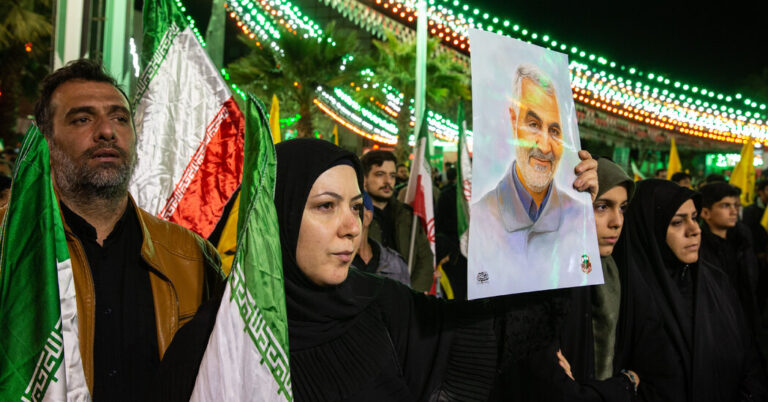At least seven officials overseeing Iran’s covert operations in the Middle East were killed in Damascus on Monday, when Israeli warplanes struck part of the Iranian Embassy complex in the Syrian capital, according to a statement by Iran’s Revolutionary Guards.
The strike killed three generals in Iran’s Quds Force, the external military and intelligence service of the Islamic Revolutionary Guards Corps, and four other officers, the Corps said, making it one of the deadliest such attacks of the long years of shadow war between Israel and Iran.
The Israeli military declined to comment on the strike, but four Israeli officials, speaking on condition of anonymity to discuss sensitive intelligence matters, acknowledged that Israel had carried out the attack.
The covert war included Israel’s targeted assassinations of Iranian military leaders and nuclear scientists, and Iran’s use of foreign proxies to attack Israeli interests. Now it is fighting more openly as tensions between the countries have escalated since Israel and Hamas, an Iran-backed militia in the Gaza Strip, went to war in October.
The attack in Damascus killed Mohamad Reza Zahedi, 65, a senior commander in the Quds Force. General Zahedi, Iranian officials said, oversaw the Quds Force’s covert military operations in Syria and Lebanon.
Gen. was also killed in the strike. Mohammad Hadi Haj Rahimi, a deputy commander of the Quds Forces in Lebanon and Syria and second in command to General Zahedi, and Gen. Hossein Aman Allahi, who is responsible for the Quds Force’s military operations in the region, according to Iranian media and an official statement from the Guards.
“For years, Israel and Iran have been engaged in what is commonly called a ‘shadow war,'” Ali Vaez, the Iran director for the International Crisis Group, said Monday in a social media post. “Today’s strike underscores the fact that this is increasingly a misnomer, as tensions rise on many fronts.”
Nasser Kanaani, Iran’s foreign ministry spokesman, said Iran was still investigating the scope of the attack but threatened consequences for Israel. “Iran, in addition to having the right to retaliate in kind,” Mr. Kanaani said, “will decide how to respond and punish the attacker.”
Syrian and Iranian news agencies reported that at least seven people had been killed in Monday’s strikes and released video footage of the destroyed building, the remains of burned cars, broken glass and debris covering the earth
The strike, two members of Iran’s Revolutionary Guards said, targeted a secret meeting where Iranian intelligence officials and Palestinian militants gathered to discuss the war in Gaza. Among them are the leaders of the Palestinian Islamic Jihad, a group armed and financed by Iran.
Israel and Iran differ in their description of the building that was hit. Iran has described it as part of its diplomatic mission in Syria, but Israel says it is being used by the Revolutionary Guards, making it a legitimate military target.
“It’s not a consulate and it’s not an embassy,” said Israeli military spokesman Rear Adm. Daniel Hagari, on CNN. “This is a Quds Forces military building disguised as a civilian building in Damascus.”
Mr. Vaez, the analyst, said, “Targeting a diplomatic facility is like targeting Iran on its own soil.” Failure to retaliate would undermine Iran’s military presence in Syria, he said, but “If they do respond they will fall into the trap that they think Israel has set for them to enter into a direct war.”
Iran’s foreign minister, Hossein Amir Abdollahian, strongly condemned the attack in a statement and said he had spoken with his Syrian counterpart about “the Zionist regime’s attack on the consulate section of the Islamic Republic’s embassy in Damascus.”
Syria’s defense ministry said the attacks occurred around 5 pm local time when Israeli fighter jets entered Syria from the Golan Heights.
Iran’s ambassador to Syria, Hossein Akbari, said in a statement released to state media that the consulate building was attacked by two F-35 fighter jets. Mr. Akbari said that among those killed were several Iranian military advisers deployed in Syria.
“This attack will have our fierce response,” he said, according to Iranian media.
The attack sent Iranian government supporters into a frenzy who took to social media to question, once again, how Israel knew about the secret meeting and whether Iran’s security apparatus had been penetrated by informants.
Peyman Syed Taheri, a conservative analyst close to the government, said in an interview from Tehran that Israel’s attack on Damascus has shaken Iranians who fear the government’s approach to the standoff with Israel has failed.
“Our national security has been violated. Either Iran must respond so that Israel does not attack us in Tehran or if it does not want to respond, it needs to rethink and moderate its regional policies and military presence,” said Mr. Taheri.
April 1, 2024
:
An earlier version of this article misstated the last name of an Iranian Quds Force commander who was reportedly killed in an airstrike in Damascus, Syria. He is Gen. Mohamad Reza Zahedi, not Zahedani.
How we handle corrections
